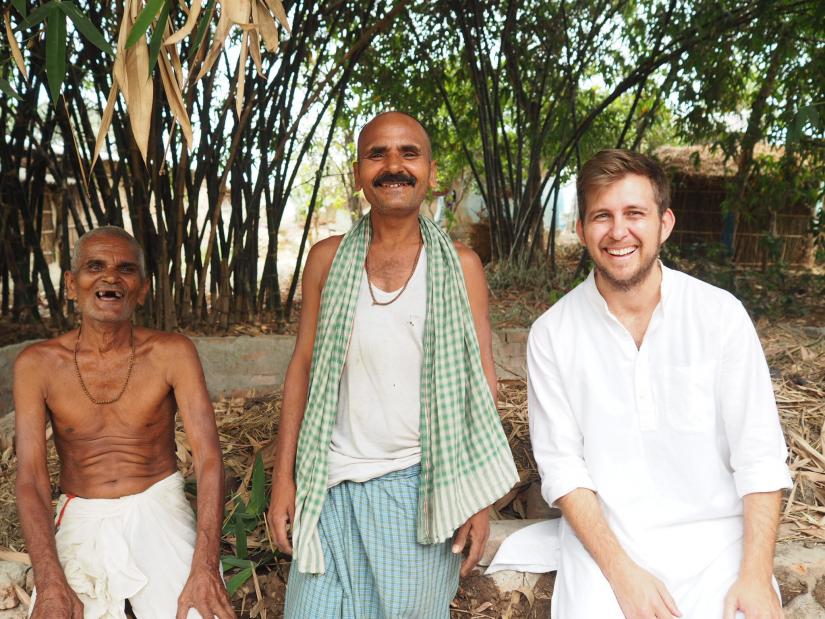Embedding empathy for social impact
When so many of the world’s problems can be traced back to a lack of understanding of each other, a little empathy can go a long way.

“Empathy at its most fundamental level is two people understanding each other and something positive coming from that understanding; it’s a basic component of being human,” says Nathan Wiltshire, a UTS Business School academic whose transdisciplinary research and professional practice is focused on empathy and its impact.
“This lack of understanding between people, particularly across cultures, is behind so many of the big issues we face in Australia and globally. We’re trying to teach people about empathy – what it is, how it works – and how to use empathy to create meaningful social good.”
A major component of Wiltshire’s work in this space is Drishtee Immersion, an ethical non-profit social enterprise connecting communities with university students for a three-week experiential learning program. The unique empathy training and social impact initiative sees students spend three weeks in rural communities in India, learning the language and adapting to local cultural customs while deeply exploring community perspectives on important challenges. This can lead towards new action-orientated partnerships for community impact.
Participating students gain new perspectives on worldviews vastly different to their own, a sense of self-belief that they can tackle challenges, and cross-cultural and interpersonal capabilities they can apply throughout their lives. And for communities, the effects can be genuinely transformative; this is the subject of an in-depth research project Wiltshire is leading with the support of a $5000 UTS Social Impact Grant.
“We’re aiming to develop a framework for measuring the social impacts of empathy-related training amongst students and the communities they interact with,” he explains.
“We've done some research in understanding the student side, but taking that next step on the community side has been extremely important.”

A key element of the research was the facilitation of in-depth interviews with villagers in a tribal community in Maharashtra who have had a long collaboration with the program. Wiltshire explains that rather than a straightforward survey, this took the form of organically evolving conversations.
“You need to sit down, often multiple times, and spend hours to properly explore things with people. For this to be effective the research method needs to match the way society exists. Letting voices emerge through discussion is a grassroots approach, which is central to our program’s ethos, and we actively avoid a Western-centric or top-down approach in everything we do."
While the painstaking transcription of interviews is ongoing, clear impacts – both tangible and intangible – are already emerging.
“People in communities see the tangible progress that comes from working with students to overcome some of the challenges they face, such as addressing water supply and quality issues, but the research is showing that many people place greater value on the intangible impacts that come when people spend the time to understand and unpack things in a different way,” he says.
“So much of it is feeling like they have a voice, that their perspective and knowledge is valued and respected. It comes back to the concept of self-efficacy, this idea that they can go out and tackle challenges and issues themselves. We sense that the impact of our empathy-based approach is so much greater than someone simply coming in from the outside, looking at a situation without truly understanding the local perspective and handing down a solution.”
The research is quite experimental; while there is existing literature on empathy-related training, it fails to explore the resulting benefits experienced by participant communities. Wiltshire says that the grant was crucial in getting the research model and delivery right.
“We were able to hire a team and take the time to construct the research project, and the process throughout was very time-consuming. We also needed to bring in professional transcribers able to extract meaning from the interviews, because so much is in the tone of voice and the dynamic of the conversations – involving the researcher, translator and often the interviewee’s entire family – can be very intense. None of this would have been possible without the grant.”
The research is ongoing, informing the continuous improvement of the program. With Drishtee Immersion already operating in six states of India and set to expand into partner communities in rural Japan next year, the potential for impact from all angles will only grow.
“The most important thing has been to get the process and methods right to achieve the cross-cultural empathy and impacts we’re aiming for. I feel like we’ve got it right now, but it will always evolve because we learn something new every time we do this work.”

